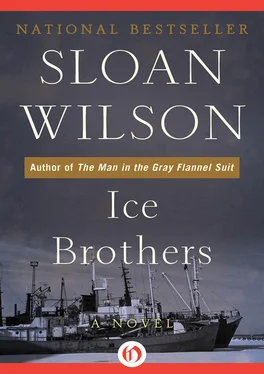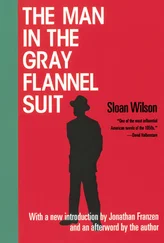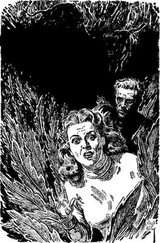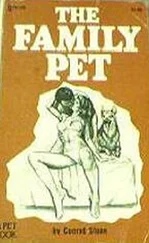“Why do you say that?”
“You don’t have the balls for it. You got no sea sense. And the men have no respect for you.”
“I’m sorry if that’s true.”
“How can they have confidence in a fucking baby chick?”
Paul was tempted to ask, “How can they have confidence in a drunk?” but he clamped his mouth shut and picked up the binoculars again. Apparently Mowrey read his mind. “I’m a ten times better sailor drunk than you are sober.”
“No doubt,” Paul replied, staring through the binoculars.
“You can butter me up all you want, but when it comes to your fitness report, I have to be honest.”
“No doubt.”
“If I give you a good report, they are liable to give you your own command. You couldn’t handle it.”
“Not yet.”
“Not ever.”
The enlisted men reacted to Mowrey’s stealing the beer being saved for a shore party by stealing it themselves. Perhaps Mowrey was muddled and guilty enough to think that he alone was emptying the big chest where the cases were kept. The screws in the hasp of the padlock were wobbly after having been taken in and out so often, but he did not seem to notice.
Yet Mowrey continued to be surprisingly effective when he was really needed. Four days before they reached the mouth of the fjord where the air base was being built, fog rolled in. They continued in the open sea until they figured that they were abreast of their destination, then headed into the ice pack, following any eastward lead. After turning and twisting for hours, Paul had no idea where he was. Occasionally the fog lifted a little, but there was nothing to see except icebergs and the reddish brown mountains, all of which seemed to look alike in the distance. The sun, the moon and the stars were all obscured in the haze overhead. For hours Mowrey stood on the flying bridge, a blanket wrapped around his shoulders to help keep off the wind.
“See that point of land broad on the starboard bow?” he asked Paul finally.
“Yes, sir. I’m not sure if it’s a point or a fog bank.”
“It’s a fog bank over a rocky point. Go around it and you’ll find the entrance to the fjord.”
“How can you tell?”
“Sea sense. You either got it or you ain’t. Can you take over now?”
“Aye, aye, sir.”
Mowrey went down to the hold, where he drank the last of the beer. The discovery that finally it was all gone almost panicked him, but he had held in reserve a bottle of pure alcohol from the medicine chest. That would keep him together until he reached the air base, where there was bound to be an officers’ club. He could get enough to drink there to last him until Paul found a source of major supply. The boy could do it, Mowrey was sure. He’d better.
While Paul worked the ship into the mouth of the fjord, Mowrey remained shivering in his bunk. The fjord itself was almost entirely clear of ice. On the chart Mowrey measured the distance, figuring that they had forty-eight miles to go to reach the base. After ordering the chief to give them all the power he could, he told Paul to call him when they reached the base. Downing the last of his medicinal alcohol, he settled into his bunk. It had been a near thing, but he had rationed the last drops of his booze exactly right.
The waterfront of the base under construction had few wharves, and those were crowded by big freighters and troop ships which had brought construction workers. The signal tower flashed a message to the Arluk , ordering her to anchor out in the fjord. When Paul told Mowrey this the captain jumped out of his bunk and studied the chart. “Christ, this isn’t a secure anchorage,” he said. “It’s too deep and no real holding ground.”
“The fathometer gives one-hundred-thirty feet,” Paul said. “We’ve got plenty of chain for that.”
“You won’t if you get a foehn wind,” Mowrey said. “Anchor, but stand sea watches. Lower the boat. I got business ashore.”
The launch had never before been used. It was a brand new motorboat twenty-five feet long, and Boats had kept its paint and varnish gleaming. Its two-cylinder gasoline engine refused to start, however. While two machinist’s mates worked on it, Mowrey paced the well deck cursing inefficiency, badly trained machinists, and especially Paul.
Finally the engine started. Mowrey leapt aboard, shouted for the coxswain, told the nearest seaman to get aboard and raced for the shore, not forgetting to make sure that the third repeater fluttered to the signal yard as soon as his feet left the deck of the ship. Taking the helm himself, he steered around the bow of a liberty ship and landed at a pontoon dock. Telling the men to stay by the boat, he hurried ashore. The first man he saw was a sentry standing at the gangway of a troop ship.
“Do you know where the officers’ club is?” Mowrey asked.
“Never been there, sir,” the man replied with a grin.
Mowrey charged up a muddy road that led up a steep hill. Quonset huts were everywhere, but few people were in sight. It took Mowrey a long time to locate the officers’ club, and when he did, he found that it was closed. A sign said that it would open at five o’clock. Mowrey, who had lost track of time, saw that his watch said it was a little after two o’clock. My God, it must be two o’clock in the morning, and that’s why the base seemed deserted. He walked around in a daze until he thought to ask directions to the chief petty officers’ club. This was a Quonset hut like the rest, but there were lights on in it. The door was locked, but it opened after he banged on it.
“We’re closed, chief,” a black steward’s mate said. “We’re just cleaning up.”
“I just got in here aboard a ship and I’m frozen to death,” Mowrey said. “I been standing watch all night. How about a drink?”
Zipping open his parka, he took out his wallet and gave the steward’s mate ten dollars.
“Well now, I guess we can accommodate you in an emergency,” the man said.
A chief steward’s mate and two others were drinking at the bar. The man who had admitted Mowrey asked what he wanted.
“A double scotch.”
“We ain’t allowed to serve doubles here,” the man said. He seemed to take a long while fussing with the bottle, the glass, and ice. Mowrey had left his parka on to conceal his rank and he was sweating profusely, despite the fact that he also had the shivers. His hand shook so badly that he had trouble getting another bill out of his wallet. The black steward’s mate took him all in at a glance.
“We got a law against doubles, but I don’t know no law against triples,” he said, and poured a highball glass half full of whiskey.
“Bless you,” Mowrey said fervently. “May the Lord be with you and with your spirit.”
The first swallow of the whiskey took the edge off the panic that had been building in him for days, and the first three swallows really began to dissolve it. His sweat stopped running and his hands steadied.
“I guess I’ll have another one of those,” he said. The steward’s mate had not taken his hand from the bottle.
Before leaving the ship Mowrey had tied a rubber hot water bottle from the medicine chest to a button of his uniform, leaving it hanging inside his coat. He had used this contrivance for this purpose many times before, and it was not difficult to pour every other drink into it. When he left the chief petty officers’ club two hours later, he had spent the fifty dollars in his wallet, but the hot water bottle was full and so was his belly. He walked back to the boat with confidence. One way or another, he would manage to leave this port with enough booze to last six months. Never again would he subject himself to the terrors of withdrawal. He felt as though he had just escaped from a sinking ship.
Читать дальше












